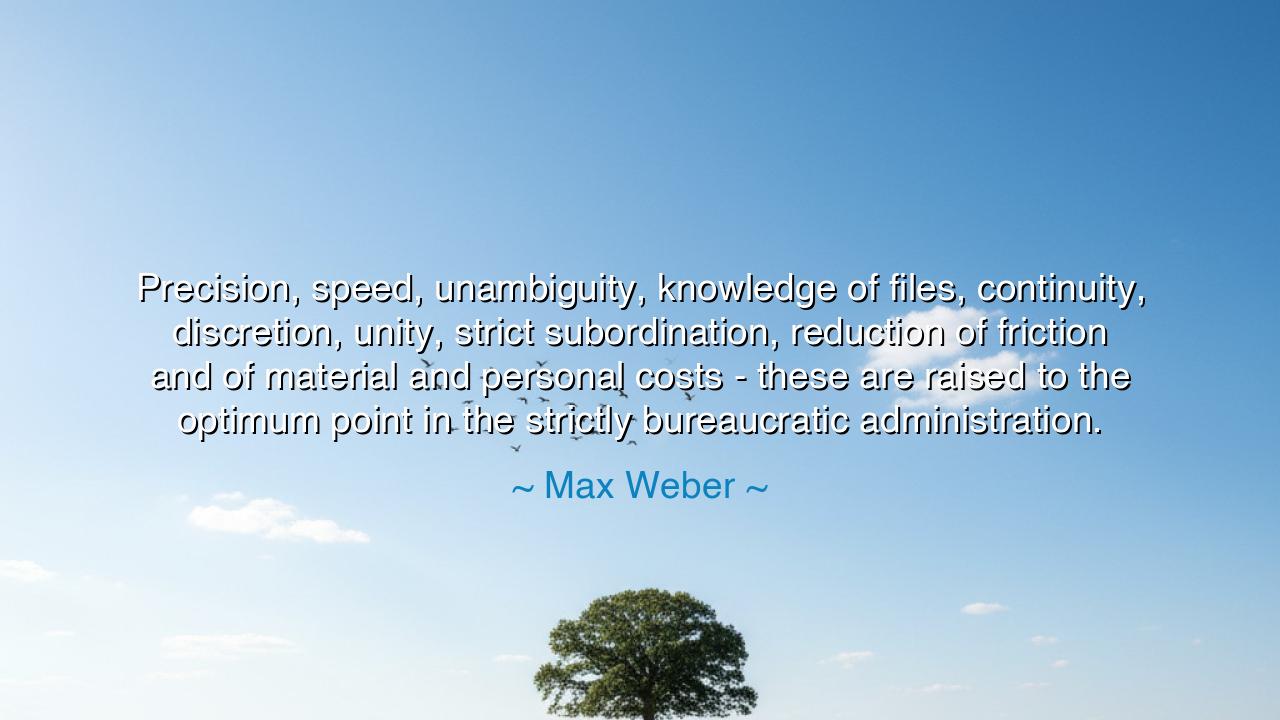
Precision, speed, unambiguity, knowledge of files, continuity
Precision, speed, unambiguity, knowledge of files, continuity, discretion, unity, strict subordination, reduction of friction and of material and personal costs - these are raised to the optimum point in the strictly bureaucratic administration.






Max Weber, the great scholar of society, gazed upon the workings of human order and declared: “Precision, speed, unambiguity, knowledge of files, continuity, discretion, unity, strict subordination, reduction of friction and of material and personal costs – these are raised to the optimum point in the strictly bureaucratic administration.” In this, he spoke not with the fire of a prophet but with the sharp clarity of an observer, unveiling the hidden strength and peril of bureaucracy. For Weber saw what many feared to name: that the true power of modern states and institutions lies not in kings nor generals, but in the silent machinery of rules, records, and ranks.
The ancients, too, wrestled with this truth. In the empires of Egypt and China, vast administrations kept grain tallies, recorded taxes, and commanded armies with the sweep of a pen. Without these, pyramids would not have risen, roads would not have stretched across continents, and dynasties would not have endured centuries. Weber understood that in such systems, the virtues of precision and continuity become sacred, for the bureaucracy does not live by passion or chance, but by order that grinds endlessly forward.
And yet, let us not miss the tone of awe and warning woven together in Weber’s words. He lists these qualities—speed, unambiguity, discretion, unity—as the very apex of efficiency, the triumph of human organization. But beneath his praise lies a shadow: for what is gained in order may be lost in soul. The machine runs smoothly, but those within it may find themselves reduced to cogs, their individuality dimmed by the vast apparatus that surrounds them. This is the double edge of bureaucracy—it builds empires, yet can stifle the spirit.
Consider the story of Napoleon’s Grande Armée. It was not merely the brilliance of Napoleon on the battlefield that made France formidable, but the bureaucratic system that fed, armed, and moved hundreds of thousands of men across Europe. Each regiment accounted for, each ration tallied, each march calculated—this precision allowed the army to strike with lightning speed. Yet, when the system faltered in the Russian snows, when supply lines froze and records could not sustain reality, the great machine collapsed, and with it the empire itself. Thus Weber’s insight is revealed: bureaucracy at its height is mighty, but it is also fragile, for it demands constant discipline and obedience to maintain its form.
The lesson for us today is profound. In our lives, as in nations, order and discipline are necessary if we are to achieve great works. To keep records, to maintain continuity, to pursue clarity and precision—these are not dull labors but the very foundations of progress. And yet, we must remember the danger: that in pursuing efficiency, we must not lose the warmth of human judgment, the spark of creativity, the mercy of compassion. Bureaucracy may be the skeleton, but humanity must remain the flesh and blood.
Practical actions flow from this wisdom. In your work, strive for clarity in your words, precision in your actions, and continuity in your duties. Keep your records in order, reduce unnecessary friction, and honor the structure that sustains your efforts. But also remember to temper rules with wisdom, and systems with flexibility. Do not become a slave to the process, but its master. Let the machine serve the human, not the human serve the machine.
Thus, children of the future, remember Weber’s teaching. The greatness of bureaucracy lies in its unity, precision, and order, yet its peril lies in its ability to strip away freedom and soul. Learn from it, use it, but do not be consumed by it. Build systems that are efficient, but never forget the human heart they are meant to serve. In this balance lies the wisdom of all administration, and the endurance of every society that dares to last beyond the span of centuries.






AAdministratorAdministrator
Welcome, honored guests. Please leave a comment, we will respond soon